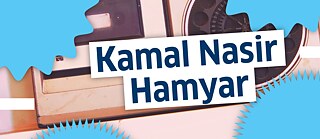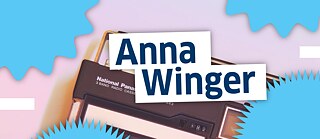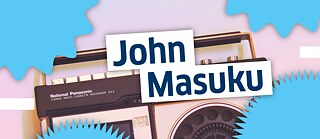Zeitgeister On Air Radio Around the World #7 with Kamal Nasir Hamyar

Kamal Nasir Hamyar takes us through the turbulent history of radio in Afghanistan: during Kamal’s childhood in the 1980s there was only one radio station in the entire country. On reaching adulthood, Kamal made it his mission as a radio journalist to provide even the most remote provinces in the country with an up-to-date broadcast schedule, in which he consistently campaigned for education, cultural dialogue and civil society values. As a former employee of NATO and the Presidential Palace, Kamal had to flee from Kabul to Munich with his family after the Taliban seized power in 2021, and he is now in the process of creating a new life for himself there.
Subscribe: Apple Podcasts | Spotify | RSS
Transcript
Soraya Sarhaddi Nelson: Welcome to Radio Around the World, brought to you by Goethe-Institut. I’m your host, Soraya Sarhaddi Nelson, from Common Ground Berlin. We often associate radio with news and entertainment, but it can also be a very effective tool to win the hearts and minds of listeners in a country where oppression and illiteracy breed deep distrust. It is why after the Taliban were ousted in 2001 that Germany helped create and run a radio network called “Sedaye Azadi” or “Sound of Freedom” in Afghanistan. It was later renamed Radio Bayan. I spoke with one of the German network’s journalists, Kamal Nasir Hamyar. He is 40 and comes from the north-eastern Afghan province of Badakhshan.
Kamal Nasir Hamyar: When I started working with radio in Afghanistan the media platform was something new for us. Not only for me, but for the whole country, for the nation. After a long period of being away from media, it was really, really a good platform for us to message our nation and for massaging the people in different parts of the community.
Soraya Sarhaddi Nelson: So, when you were younger though, when you were a child, a teenager at that time, was there radio in Afghanistan?
Kamal Nasir Hamyar: Yes, there was, but it was not like something in FM. It was only one radio all over Afghanistan, so it was broadcasting in our native languages. So, I was understanding the importance of radio for a country like Afghanistan, because the country, which is facing lack of or shortage of electricity, that the people were not able to have TV or something else, so radio was the only channel that the people would be receiving news, entertainment and other things.
Soraya Sarhaddi Nelson: When you were in your house with your family, did you listen to the radio in Badakhshan?
Kamal Nasir Hamyar: Absolutely. When I was a kid, my father was a little bit educated, and he was a previous government employee. He always, when he was coming at six o’clock in the evening and very early in the morning, he was listening to the news.
Soraya Sarhaddi Nelson: So, it was news, did you listen to music on the radio or were there programs, other programs?
Kamal Nasir Hamyar: The radio we were listening to since I was a kid, it was not something for the locals, it was international radio stations, which were broadcasting for the Persians, for the Farsi speakers. During the day, we had some kind of entertainment, it’s called [unintelligible]. It was really entertaining.
Soraya Sarhaddi Nelson: So, like New House, New Life?
Kamal Nasir Hamyar: Exactly, this is in English, yes, New House, New Life.
Soraya Sarhaddi Nelson: So, how did you come to be at Sedaye Azadi and Radio Bayan?
Kamal Nasir Hamyar: Well, before I started with Sedaye Azadi I worked for one and a half years in Afghanistan Radio Television. So, I was a member of the International News Desks for Radio Television of Afghanistan and beside of my political science educations, I had, let’s say, it’s not a real scholarship, but it was a project which was funded by Deutsche Welle Akademie in Afghanistan in Radio Television of Afghanistan. And we were a group of people who were eligible and we were trained for eight months in journalism in Radio Television Afghanistan, or RTA, and our trainer was German and they trained us in English. So, the team…we were working for the International News Desks of RTA, so it was a professional team. It was trained very well, so they all know English, they had good, you know, kind of knowledge of the native languages in Afghanistan. So, we were the first groups producing news for Radio Television of Afghanistan. It was all about international news from different news agencies and we produced it in Dari and Pashto for Afghanistan. So, before I started with Sedaye Azadi I was working, it was a background for my journalism experiences and it’s related to your question that how I come to the journalism to work here because I had this training and then I left Radio Television of Afghanistan in Kabul and went back to Badakhshan, my province. I worked with other international organizations for a few months and then I joined Radio Sedaye Azadi from Badakhshan. Besides radio they had also newspapers, so we were producing some, you know, articles for the newspapers but later on I started to work with radio.
Soraya Sarhaddi Nelson: And what did you do on the radio? Were you were reading the news or were you doing, being, a disc jockey or what was your job?
Kamal Nasir Hamyar: When I was in Badakhshan, we were producing different and various topics. It was culture, it was development, it was supporting civil societies, it was also education. So during that time the German government, or let’s say part of the network, we had P.R.T. professional reconstruction team in each province, it’s not each province, but partially. So one of the P.R.T. was based in Faizabad, the center of the province. And I was as the reporter from the province, reporting for Sedaye Azadi in Kabul. We were covering cultures, history, development, civil society, education, women and girls’ rights.
Soraya Sarhaddi Nelson: And did the signal go everywhere in Badakhshan? I mean was it throughout the province?
Kamal Nasir Hamyar: Not all over the province but in the center of the province, yes. Even the neighbor villages to the center. So it has a good impact because people were listening to it because of having different – let’s say it has news, entertainment, music and other programs as well.
Soraya Sarhaddi Nelson: Did people respect it? I mean were they suspicious because NATO was running this radio station or funding this radio station? Did people like it or were they suspicious?
Kamal Nasir Hamyar: Well, it depends on the areas. As far as I worked for Sedaye Azadi for almost two years in Badakhshan, I didn’t have that feeling. At the beginning, yes, people were a little bit thinking, a little bit different – that it’s something belongs to foreigners. It’s something that belongs to other countries, but basically the programs were broadcasting through the channel, it was convincing people. So later on after 2010, in 2012, in 2013 when I went back to Badakhshan, I see a different perspective or a different understanding of the people what they were hearing from radio. And the good thing for Sedaye Azadi was the frequency. It was very easily accessible to people listening from vehicles, from their cars and sometimes even I had listened to my reports through sitting in a taxi and it was a different feelings as well.
Soraya Sarhaddi Nelson: Did people recognize your voice? Let’s say if you took a taxi or…like, “Oh we know you, we’ve heard you on the air!”
Kamal Nasir Hamyar: Not generally but some, yeah because Faizabad is not a big city, it’s covered by mountains and a river and is divided by two parts – but yes, based on my backgrounds, so yes, but basically due to security issues we all the time were said that “Please, avoid to tell or introduce yourselves that you’re working for NATO.” And sometimes Sedaye Azadi was mixed with another name, was mixed together, so people were not understanding the differences between two names Sedaye Azadi, it was some other radio station as well.
Soraya Sarhaddi Nelson: Radio Azadi…
Kamal Nasir Hamyar: Radio Azadi and Sedaye Azadi, so people were not too much to understand or separate it, it’s something different, but it was a good coverage as well for us.
Soraya Sarhaddi Nelson: So then you came back to Kabul though to work for Radio Bayan?
Kamal Nasir Hamyar: Absolutely, even when it was Radio Bayan I moved to Kabul, so the position I worked for “Radio Azadi” in Badakhshan was finished, it’s kind of organizational decisions and they asked me to join them in Kabul. But before I joined to Sedaye Azadi they selected me as a TV journalist because beside of radio and magazines we also had a TV production let’s say, so because the TV production or the TV section was producing messages in order to support the Afghan national armies and militaries and so on. And I worked for almost one year with TV and then I moved to Radio Bayan.
Soraya Sarhaddi Nelson: And what did you do for Radio Bayan?
Kamal Nasir Hamyar: At the beginning when I was producing cultural packages for radio, I introduced many, many historical places of Kabul for the nation. So my packages was part of a show, so it was focusing to a show and later on the management decided to keep me as a coordinator and supporter to the chief editors for the Radio in Kabul.
Soraya Sarhaddi Nelson: So you weren’t on air anymore?
Kamal Nasir Hamyar: I did reading news, I read packages and I was hosting guests for the shows, different things and then they said, yeah, so we need you to coordinate the whole radio with us. So, because mainly our colleagues were internationals and so from Afghan side I was summoned to lead the radio together with my international colleagues.
Soraya Sarhaddi Nelson: So when did you stop working for Radio Bayan?
Kamal Nasir Hamyar: I stopped working with Radio Bayan December 2016 and I ended my journey with radio. I was a little bit interested to work for the Afghan government so I joined the presidential palace and I worked as a chief of staff for the senior advisory of president on United Nations affairs and I continued there for one and a half years and then I left. I couldn’t find myself in an area like presidential palace which is full of politics and playing games and then I decided that it’s better for my career to – before something happened – to leave it. And then I left the palace and then I joined the independent elections as an advisor to the chairwoman of the IECO – Independent Election Commissioner of Afghanistan. So, it was continued up to the 2019 election and then I left as well there. And then recently before the Taliban came I was an advisor to the Ministry of Peace and I worked there almost for eight months.
Soraya Sarhaddi Nelson: Ministry of Peace?
Kamal Nasir Hamyar: Yeah, Ministry of Peace. Yeah.
Soraya Sarhaddi Nelson: And then what happened – the Taliban came and it was so fast, it happened so fast?
Kamal Nasir Hamyar: Absolutely. We had two meetings with the minister together with some other government entities. We had these peace councils which was led by Dr Abdullah Abdullah, so we had two meetings in the afternoons. We were preparing ourselves for the meeting together in the ministerial office. So it was around 11 o’clock or something. Then we heard some kind of gangs, shootings and things like that and then…actually we were in a place or we were in a ministry which we were facilitating all peace negotiations but we were not aware what’s coming. And it was a big shock. And it was around 12:00 that everyone left offices, especially the high people who work for those different positions in the ministries –deputies, you know directorates and advisors all left. And the minister was in Doha and we received a call – “You have to leave the office.” So I left my laptop, everything, whatever I had in my desk. And my wife, she was a university lecturer – she has a Master’s degree in Turkish literature. And she was at the university and then I called her and she was in the same situation, and we called everyone who was outside to come back home. We were totally afraid, we were scared and so we had no idea. Even until the afternoon, so we were not expecting having Taliban to take all over the country – especially the capital Kabul. And yeah, we all came back home and we stayed at home so…
Soraya Sarhaddi Nelson: So what was the day when this was happening?
Kamal Nasir Hamyar: It was the 15th August [ed.: 2021].
Soraya Sarhaddi Nelson: So you went home and then what?
Kamal Nasir Hamyar: And then we all stayed and then I started connecting and communicating with other family and friends. It was at there that most of the country was under Taliban control. I had no idea what to do. I have seen that the international forces were all in Kabul airport and I talked with friends to find a way to leave the country and it was absolutely, very, very dangerous and even I couldn’t, you know, think to let’s say step away from my door. I just stayed at home.
Soraya Sarhaddi Nelson: So how did you get out of Afghanistan? Did the Germans evacuate you or who evacuated you?
Kamal Nasir Hamyar: Yeah, for the evacuations – so I [unintelligible] several sources even with my American colleagues and others and I stayed for three months in Kabul.
Soraya Sarhaddi Nelson: Three months after the Taliban took over?
Kamal Nasir Hamyar: Yeah absolutely, and I was changing my locations, so usually I was staying in basements and changing my houses, so staying with relatives – especially when it’s dark during the night. And it was very difficult to walk on the streets. Personally, for me it was very tough because of my information, my background especially for NATO, for the presidential palace with the ministries and so on.
Soraya Sarhaddi Nelson: Did you listen to radio or to TV to figure out what was going on?
Kamal Nasir Hamyar: Absolutely, I had access to the internet. So I had internet at home and the whole day and night, so whenever I am at home – so I just maybe let’s say if it’s not an exaggeration a hundred, hundreds of emails I was writing during the day to find a way to leave or to flee the country. So during those three months I was communicating, because recently I had a project with the Germans. There was a media center in Masar-e Scharif. There was a legion officer for them and the contract was from the German military from Masar-e Scharif, so there were three military advisors for these media centers and I contacted them. They were not in Afghanistan at that time and then they said “Wait and we will keep you on the list.” And finally they did it.
Soraya Sarhaddi Nelson: So you went to Kabul airport with your family?
Kamal Nasir Hamyar: Yes. It was an afternoon – it was the 26th of November, so I had a laptop, I had my smart phone and whatever I had which was connected. Actually I had deleted everything I had on my smart phone and on my laptop.
Soraya Sarhaddi Nelson: Including all of your radio stories – everything?
Kamal Nasir Hamyar: All, all, everything, whatever I had. So it was, if I feel that it’s dangerous that they find it, then I deleted it all and I gave my smart phones and my laptop to my wife. And we passed with some other families, they were accompanying us, to I think the second gate.
Soraya Sarhaddi Nelson: Second checkpoint at the airport, yeah?
Kamal Nasir Hamyar: Absolutely, yeah. And we have seen Taliban there as well, so with long hair with…absolutely different.
Soraya Sarhaddi Nelson: Was this a German flight or what kind of flight was it?
Kamal Nasir Hamyar: No it was a private flight. When I arrived in Pakistan – so because I had communicated withGIZit was an organization which was facilitating all people who were eligible for receiving an immigration visa. So, I stayed for 13 to 15 days, if I’m not wrong, in Islamabad and we waited for our visa for [unintelligble] for flights and then we flew from Islamabad to Leipzig Airport.
Soraya Sarhaddi Nelson: And you ended up in Munich at the refugee camp for six months?
Kamal Nasir Hamyar: Yes, I stayed with my family for six months in a camp. I’m very thankful for my German colleagues because they also had a group for Afghans who fled from Afghanistan to Germany. And they had groups of volunteers helping them in terms of administrations – finding a house, you know, processing all these documentation and paperwork here. And luckily, I had a man who worked for 10 years with the German Minister of Defense but he was retired so I found him through that group of German soldiers who were supporting Afghans who newly arrived in Germany. And I moved from the camp last July to here – to this flat.
Soraya Sarhaddi Nelson: So July 2022?
Kamal Nasir Hamyar: Exactly yeah.
Soraya Sarhaddi Nelson: And what do you do now? Do you still do radio work?
Kamal Nasir Hamyar: No, for the first six months up to let’s say 10 months, so I waited to start my German classes, German language classes. And I did study and still I’m continuing to study to complete my German skills, languages, and in terms of my profession it’s…this is what I feel but this is also a reality that it’s not easy to go back to work for eight years because it’s not Afghanistan, it’s Germany. Germany has its own standards and beside the standards of journalism, it could be not that much of a big deal but in terms of doing something for a community, the knowledge and the skills of the language is the most important to do that work here.
Soraya Sarhaddi Nelson: Do you miss doing radio?
Kamal Nasir Hamyar: Absolutely.
Soraya Sarhaddi Nelson: What do you miss about it?
Kamal Nasir Hamyar: Well, when I worked for Radio Bayan in Kabul, it was a big community. It was reaching out from one province to another province of Afghanistan. I was listening to every individual packages or reports which we were receiving from different provinces of Afghanistan, so sometimes it was very tough, sometimes it was very joyful and I learned a lot. Afghanistan is a traditional country but one part to another part is different. Yeah, it was absolutely different.
Soraya Sarhaddi Nelson: So do you think radio was a really good way to bridge that gap, to bridge all these divisions – different languages, different cultures, different geographic locations? Was radio the best way in Afghanistan, you think, to bring people together?
Kamal Nasir Hamyar: Absolutely, because radio was a really, really easy platform for our nation to access information. And the way we worked for “Bayan” – it was not only news. So we were even educating people. We were messaging people that you have to stand with your kids, with your daughters, with your sisters, mothers to be educated. We were messaging our nation how it is important for them to support their national forces. We were messaging how bad the Taliban are for their kids’ futures, how bad the Taliban are for their economies, how bad they are for their education. And we even had surveys to have a different understanding of our audiences and we had really sometimes surprising feedback. It was not [unintelligible], It was not some other free media but the context of “Bayan” was really promoting and educating people because Afghanistan after long time of having a broken system, a corrupted system, we were educating people that how they can help their government in terms of not eradicating but reducing corruption. So what I believe, yeah, Radio Bayan was a good stage for educating, for messaging people to direct them in the right way, for their kids’ future, for the country’s future.
Soraya Sarhaddi Nelson: That was Kamal Nasir Hamyar, a former radio journalist from Afghanistan who lives outside Munich with his wife and two daughters. I’m Soraya Sarhaddi Nelson of Common Ground Berlin and thank you for listening.
Host: Radio Around the World is brought to you by the Goethe-Institut. Thank you to all of our friends and partners for making this series possible. [Music]


